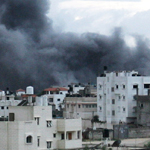Registration
Thank you!
You will receive an email confirming your registration.
IMGXYZ1092IMGZYX The continuing violence in Gaza between Israel and Hamas is reverberating across the entire region, generating increased scrutiny on the Egyptian government’s role in the crisis, and opening new opportunities for mediation by moderate states like Turkey. Carnegie experts in the Middle East and DC explain the various regional perspectives on the conflict, its current impact on neighboring nations, and its possible outcome.
Key Points:
- Hamas has not rejected a newly brokered, mediated ceasefire and would likely accept one. Unlike the 2006 war between Israel and Hizbollah, which left Hizbollah with greater political power, Hamas is unlikely to strengthen its influence as a result of the violence.
- The Egyptian government, along with some others in the region, sees Hamas control of Gaza as a national security problem. By closing its border crossings with Gaza, it is weathering a campaign of Arab media and public outrage and accusations that it is complicit in Israeli actions.
- By talking with Israel and sending its prime minister to Syria for negotiations with Hamas, Turkey will have more influence when the time comes to mediate and ultimately shape the outcome of the conflict.
- The Israelis have not set Hamas’ destruction as an immediate objective of military action, which makes it easier for them to declare victory, even if—as is likely—Hamas retains power in Gaza.
- Hizbollah has not threatened any action; it appears Lebanon will remain out of the conflict.
